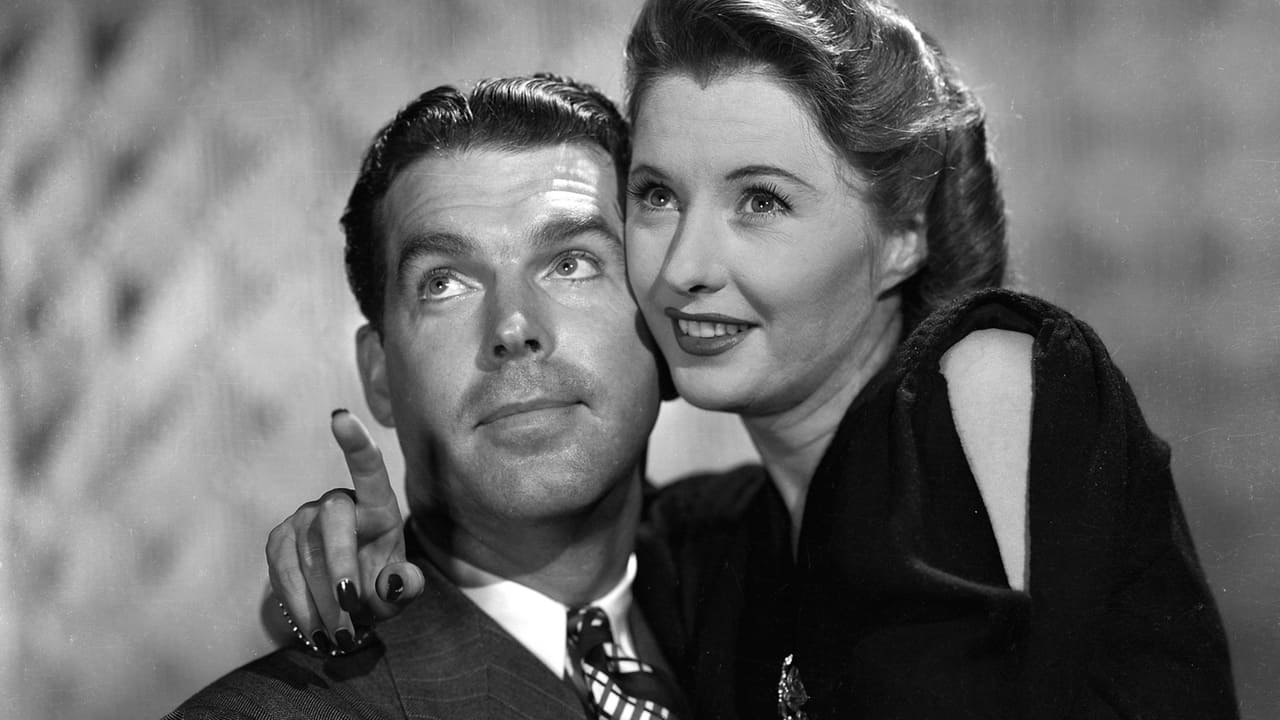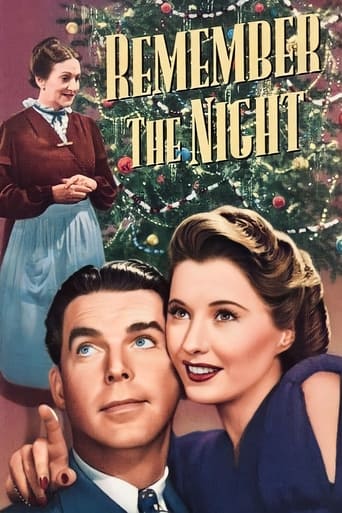

Now here's an offbeat Christmas classic which must be rediscovered. Barbara Stanwyck and Fred MacMurray are a pickpocket and district attorney who reluctantly fall in love over the holidays.It's so nice to see a film with so much warmth, humor, and good will. I know miserable families technically make for much more interesting stories, but I adored seeing the tenderness and strong bonds between MacMurray's character and his family, and the way it radiated onto Stanwyck's lady thief.Absolutely recommended by me, though with Stanwyck in the line up, I shouldn't have to tell you twice, right?
... View MoreProsecuting attorney Fred MacMurray arranges bail for shoplifter Barbara Stanwyck, then takes her home to meet his family at Christmas. Along the way they fall in love. This is a real gem. It pairs MacMurray and Stanwyck together for the first time. They would, of course, appear together again a few years later in a certain little movie called Double Indemnity. Perhaps you've heard of it. Both stars are in top form here. Backing them up is a fine supporting cast that includes Beulah Bondi, Elizabeth Patterson, and Sterling Holloway. A charming Christmas romantic comedy with a great script from Preston Sturges. It's a wonderful blend of the sentimental and the cynical. Despite some complaints I've read, I found the ending to be appropriate and gutsy for a romantic comedy. My favorite scene is probably the one early on where Stanwyck's lawyer (Willard Robertson) appeals to the jury. "Hypnotism!" Classic Sturges. Give this one a shot and I'm sure you won't be disappointed. It's a terrific Christmas film but also sure to please most romantic comedy fans.
... View MoreRemember the Night is a very sweet, warm-hearted film well performed by Barbara Stanwyck and Fred MacMurray. Barbara Stanwyck's character literally comes from the other side of the tracks, running away from a troubled home life as a teenager, she is caught shoplifting before the Christmas holidays. Fred MacMurray plays a district attorney who hasn't lost a case, is set to prosecute her, however he gets a continuance until after the New Year. Feeling guilty because of the Christmas holidays he bails out the beautiful thief, and ends up taking her to his mother's farm for the holidays. Belulah Bondi plays MacMurray's mother who understands the girl has had a troubled past and shows her kindness and compassion. Soon MacMurray falls in love with her after realizing the lack of love she has had, and he sees the positive change that the stable home atmosphere has given her. This film has a delightful mix of witty dialogue along with good directing that helps to keep Stanwyck's character personable and the story from miring down in self pity. Elizabeth Patterson lovingly plays MacMurray's Aunt along with comical Sterling Holloway as farm hand Willie. Although the ending is bittersweet, is not detrimental to the story with it's touching characters and amusing situations, it remains a satisfying and pleasurably entertaining film. Highy recommended for those who appreciate films from the past with good solid performances.
... View MoreLike Christmas EVE (1947) that I watched the day before, this is a vintage Yuletide Hollywood film that should be better known in view of the talents involved; however, unlike the later film – which, given its undeserving *½ rating on Leonard Maltin's Film Guide, I was not expecting much from and was somewhat pleasantly surprised by the outcome – this turned out to be something of a disappointment. Not that it is in any way bad but, having a stylish director like Leisen, a peerless screenwriter like Preston Sturges and the sure-fire teaming of Barbara Stanwyck and Fred MacMurray, it should have been a comedy classic. Rather tellingly, it seems to me, the film proved Sturges' last screenplay assignment before embarking on his meteoric directorial career that redefined the screwball genre; needless to say, the two leads would subsequently be iconically reteamed in Billy Wilder's seminal noir, DOUBLE INDEMNITY (1944) and twice more thereafter in the following decade which I am not familiar with.Anyway, the narrative revolves around an attractive chronic shoplifter (Stanwyck) who gets away with an expensive bracelet from one shop but is apprehended when trying to pawn it in another; MacMurray is the prosecuting D.A. who, after suffering through the would-be heart-rending histrionics of her has-been thespian attorney, secures a recess until after the festive season but gets a change of heart upon watching Stanwyck make her way to spending Christmas in police custody. Therefore he arranges to pay her $5,000 bail but the bondsman misconstrues his interest and dumps her on his doorstep – to the bemusement of MacMurray's "dumb" colored butler! Given the situation and the time of year, he takes her out to a dinner dance (where he embarrassingly comes face-to-face with the presiding judge) but, upon discovering that they both hail from Indiana and that she had not been home for the holidays in years, they are soon en route together to their old hometown. Unfortunately, since MacMurray only makes this trek once a year, they get lost and spend the night in a farm and wake up surrounded by a herd of cows and their irate owner who, once again misinterpreting the situation, rides them off to the Justice of the Peace at gunpoint. Thankfully, Stanwyck's quick wits – that had seen her slid out of many a jam with the law in the past – come to their rescue as she almost sets the latter's office on fire.So far, so humorous...even if it never quite reaches the zany heights of Leisen's earlier classics EASY LIVING (1937; from another Sturges script) and MIDNIGHT (1939; from a Billy Wilder-Charles Brackett screenplay). However, when the couple hit Indiana, the laughs mostly subside and are unfortunately supplanted by grim domestic melodrama (Stanwyck's confrontation with her unforgiving mother who has since remarried) and corny sentimentality (MacMurray's family includes concerned mother Beulah Bondi and future Sturges stalwart Sterling Holloway as an annoying simpleton of a farmhand). The expected local color (for those who like this sort of thing) comes courtesy of home-made sweet cooking, a philanthropic bazaar, a barnyard New Year's Eve dance and a series of individual piano renditions/sing-a-longs by the two stars and Holloway. The return trip to New York takes them to a romantic stroll along Niagara Falls (to avoid meeting up again with the proprietor of the arsoned "Justice of the Peace" office) but, as they reach the Court in the same taxicab, each decides to "throw" the case in favor of the other party but since Stanwyck admits her guilt (following MacMurray's overzealous grilling intended to win the defendant the jury's sympathy), there is little else for them to do except for a concluding teary-eyed reconciliation in the court's elevator in which they swear each other eternal love. For the record, this was MacMurray's fourth of 9 films he made with director Leisen and he was also the nominal star of one of the most notorious of all Christmas movies, THE MIRACLE OF THE BELLS (1948; co-starring Frank Sinatra as a priest)!
... View More